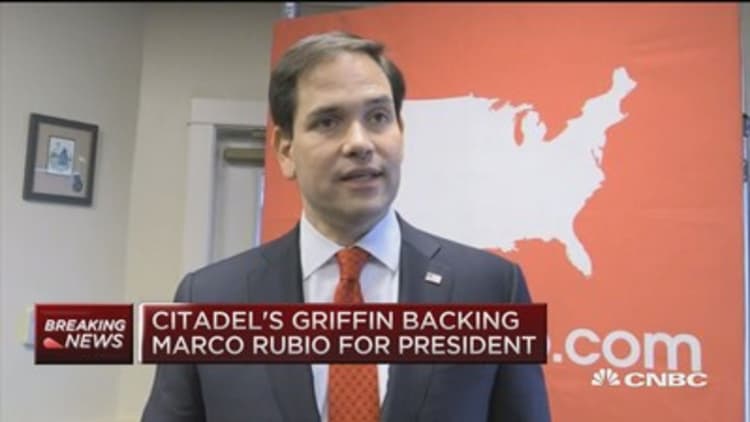Marco Rubio picked up steam this week with a strong finish in Iowa. The U.S. senator from Florida will have a fresh pile of Wall Street cash at his disposal as he takes aim at the next voting states.
Billionaire hedge fund managers Paul Singer and Ken Griffin gave $2.5 million each to the Conservative Solutions PAC, an outside organization that supports Rubio, as 2015 drew to a close, according to Federal Election Commission data released this week. The noted Republican donors helped to make the securities and investment industry the top-contributing sector to pro-Rubio groups in 2015, with nearly $10 million in donations, according to the Center for Responsive Politics.
The Wall Street money flows show the traditional power players' continued gravitation to Rubio and former Secretary of State Hillary Clinton on the Democratic side. They also underscore the consolidation of support as the GOP field gets thinner.
"Some of the traditional Republican donors have been lining up behind Rubio, while Ted Cruz is able to line up some support behind conservative donors. Major donors have been looking at people other than Jeb Bush," said Anthony Corrado, a professor of government at Colby College who studies campaign finance.
The securities and investment industry led all sectors with about $90 million in donations to candidate committees and the PACs supporting them, the Center for Responsive Politics said. Bush led all candidates with about $34 million in contributions from the investment community, followed by Clinton at about $17 million and Rubio at nearly $10 million.
But in recent months, Wall Street money — and the support of the so-called establishment — has largely shifted to Rubio from Bush.
Rubio took third place in Monday's Iowa caucuses behind Cruz, the U.S. senator from Texas, and bombastic billionaire Donald Trump. Since Iowa typically picks more conservative candidates than other states, Rubio's 23 percent showing was better than expected.
His strength comes as some rivals have looked increasingly vulnerable. Sen. Rand Paul of Kentucky suspended his campaign Wednesday after former Arkansas Gov. Mike Huckabee dropped out earlier in the week.

Former Florida Gov. Bush, New Jersey Gov. Chris Christie and Ohio Gov. John Kasich all may need a strong showing in next week's New Hampshire primary to save struggling campaigns. Kasich said Wednesday that he would consider dropping out of the race if he "gets smoked" in New Hampshire.
Fundraising to close 2015 reflects those dynamics in the Republican race. Conservative Solutions, the pro-Rubio super PAC, raised more than $14 million in the second half of 2015, about as much as Rubio's campaign committee did in the fourth quarter. Contributors to campaign committees have spending limits, so mega-donors like Singer and Griffin have increasingly used PACs to shell out millions.
Right to Rise, a pro-Bush PAC, saw contributions fall to about $15 million in the second half of the year, down from more than $100 million in the first half. Wall Street donors flocked to Bush in the first half of 2015, but largely shifted their allegiance to Rubio toward the end of the year, according to the CRP.
On the Democratic side, Clinton's bid got a huge boost from billionaire investor George Soros. He gave $6 million to Priorities USA Action, a pro-Clinton super PAC.
Of course, Wall Street money is not essential to fundraising success. Cruz's campaign committee raised more than $20 million in the fourth quarter, and more than half of pro-Cruz money in 2015 came from the real estate industry, the CRP said.
U.S. Sen. Bernie Sanders of Vermont, who nearly tied Clinton in the Democratic caucus this week, raised more than $33 million in the fourth quarter, mostly from small individual contributions.




